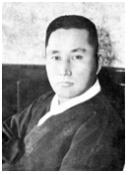Name: admin
2013-12-26 16:04:16 | Hit 2535
Files :  Lee Gwang-soo.docx
Lee Gwang-soo.docx
 Lee Gwang-soo.docx
Lee Gwang-soo.docx
Abductee: Lee Gwang-soo
Recorded Date: March 13th, 2007
Profile of Abductee
Name: Lee Gwang-soo (pen name Chunwon)
Date of Birth: February 1, 1892
Place of Birth: Jeongju, Pyeonganbuk-do, North Korea
Last Address: Hyoja-dong, Jongno-gu, Seoul, South Korea
Date of Abduction: July 12, 1950 (age 58)
Place of Abduction: Home
Occupation: Writer, Journalist
Education/Career: Waseda Univ. Department of Philosophy / Teacher of Osan School, Chair of Chosun Writer’s Association, Vice President of Chosun Daily
Dependents: Wife, 1 Son, 2 Daughters
Appearance/Personality: Strict, Attentive to Family
Profile of Testifier
Name: Lee Jeong-hwa (born in 1935)
Relation: Second daughter
Type of Witness: Direct witness
Summary of the Abduction
- Chunwon Lee Kwang-su is a very well-known writer who wrote the first modern full-length novel and a journalist.
- At Waseda University, he prepared the draft of the February Eighth Declaration of Independence against Japanese colonial regime.
- On July 12, 1950, three soldiers of the Communist Army came to the abductee’s house and urged him to turn himself into the Internal Police and then took him to the Jong-no Police Station.
- On around Sept. 25, 1950, the family sent supplies into the Seodae-mun Prison, but he was proven to be transferred to the Pyeongyang Prison already in July.
- According to hearsay from the North Korea, he was reportedly died in 1950, but the hearsay has several versions and the date of death is not clearly identified.
Description of abduction
Q. Could you please describe the situations when the Korean War broke out?
February 1, 1950 was my father’s birthday. The day still remains as one of the happiest moments of my life. After my father was released from imprisonment he serially wrote novels on newspapers and actively participated in the publication business. It was the happiest and the most affluent days of my family. He was in a good condition in terms of health and my brothers and I could focus on studying.
However, my father fell sick once again in June. From June 23, he had to get shots everyday for high fever and pneumonia.
On the day the Korean War broke out, my mother was out to get medications for my father. I, too, was out all day playing with my friends. All of a sudden, I felt something was not right and ran home. There were a lot of military trucks with soldiers on the road instead of ordinary cars. We wondered what was happening out there, but our radio was broken at that time. On that night, my father struggled with high fever with a temperature of 39 degrees Celsius (102.2℉). My mother read the newspaper that reported the invasion of the Communist forces and started to worry. My father smiled and calmed her down, saying that “this nation is not that weak.”
However, the Communist forces marched down to Seoul, sweeping everything in its way. People came to our house on June 26 and told us we should flee for our safety. By the evening, we could hear the roaring of guns. My mother started to pack our belongings and told my brothers and I to go to our aunt’s house in Cheonan. The problem was that my father, due to his deteriorated condition, could not walk on his own.
On June 27, Seoul was nearly empty with people fleeing the city for survival. On the 28th, Seoul fell into the hands of the Communists. I heard the siren around two o’clock at night and shook my mother to wake up. However she told me not to worry, saying that it was impossible for Seoul to be occupied by the enemies in only three days. At six o’clock in the morning, we found out that the bridge over the Han River had been destroyed and the Communist forces entered the city.
My father seemed as if he lost his mind and my brother cried out loud. We had no choice but to flee, so we started to set up plans. My father braced himself up, and tried to walk, only to collapse after a couple of rounds on our front yard. At that time it was very difficult for us to find a relative who could help us, let alone a total stranger.
On July 3, my father said that he now could walk and we decided to leave Seoul the next day. However, his condition further deteriorated, and he could not even get up from his bed. At that time, young men were dragged into the army, so we had to hide my older brother. He left the house before us for his safety.
Q. Please describe the situation when your father was abducted.
On July 6, about 20 people barged into our house, locked us in one of our rooms and started to paste confiscation stickers on all household goods. From that day, guards stood in front of our doorstep, on which they stuck a foreclosure tag issued by the Internal Police Station.
On July 7, around 10 armed North Korean soldiers and others from the People’s Committee came to our house to take my father. When he told them he could not walk, they took him by his arms, saying it would not take so long.
My father returned home in two hours, breathing painfully. Officers at the Internal Police Station sent him back home, saying that they would decide what to do with him after he submitted a confession report on his past deeds. We should have left Seoul right away, but my father’s health was in a terrible shape back then and it was even impossible for him to leave the city on someone else’s back. He had to stay in bed all the time and we were detained in our house.
One day, there were no guards at the gate. My mother helped my father get dressed in cotton summer jacket and pants, and just as they were putting on shoes to run away, an Internal policeman dressed in civilian clothes entered the house. Speaking in Ham-gyeong Province (territory of North Korea) dialect, the officer said “You should come with us. It won’t take long.”
Behind him, came two young men in uniforms and asked my father if he had finished writing the confession report. “I have done nothing wrong so I have nothing to confess.” My father, though sick and frail, answered with a clear voice. They handed over a piece of paper and said “If so, you shall write it now. We’ll give you 20 minutes.” After they went out, my father shredded the paper into pieces. When the officer returned and saw what my father did with the paper, he got furious and yelled “Are you trying to buy time for the U.S. jets to arrive? Come with us now!” They dragged my father out and pushed him into a small car which was waiting in front of our house.
Q. What happened after your father was taken?
In sometime around July, my older brother, exhausted due to hunger, returned home from a nearby cave which he was hiding in. My mother stacked up a woodpile in the basement for him to hide in. However, one week after his return, several officers from the Internal Police Station barged in and told us to leave the house right away. My mother begged them to give us one more day to pack, worried about my brother hiding in the basement. The officers sat in a room and watched our every move, waiting for us to leave the house. When they went out for dinner, my mother plucked off the window of the basement to let my brother out. He fled the house, sneaking over the wall to a neighbor’s.
On August 5, we were thrown out of our house and went to a hospital in Mapo-dong where a relative of my mother’s was living in. We were running out of food. My mother sold her gold ring to get some money to buy food. It was truly devastating days. My mother and I went to the Seodaemun Prison, where we thought my father was detained in. We brought some extra clothes and medicines and requested a visit. The guard at the gate told us that he would deliver the package we brought to my father, but in fact, my father was not there at the moment. I later found out that my father had been sent to a prison in Pyongyang on July 16, just four days after his arrest on the 12th.
Reason behind the Abduction
Q. Why do you think he was abducted?
He was a very well-known writer and had lots of followers. He was a useful tool for the propaganda.
News after the Abduction
Q. Did you make any effort to find out where you father is?
On September 28, after Seoul was recaptured, we ran to Seodaemun Prison, hoping that my father was still there. However, the prison was empty, and so was our house in Hyoja-dong. When I entered my father’s room, I could not help but think about him and the happy days we had spent together. Feeling his presence, I could not leave the room for awhile.
Kim Kuk-hu, the special correspondent of Joongang Daily, heard about my father in Soviet Union from Jeong Sang-jin, who worked for the North Korea’s Culture and Propaganda Ministry. My father had to walk all the way to Ganggye in Pyeonganbuk-do with other abducted artists and writers. I cannot even imagine the pain and suffering my father, who was so frail and could barely walk, had to go through in such intense coldness. I later heard that he later could not even take a step forward due to the frostbites all over his hands and feet. Obviously, his condition deteriorated.
Q. Have you heard any news about him?
According to Kim Kuk-hu, my father was sent to an army hospital, 15km away from Ganggye, in which he passed away in December, 1950.
In 1991, my older brother Lee Yeong-geun paid a visit to my father’s grave in North Korea. The date of death engraved on the headstone was October 25th. My father has always been my teacher, and he always was, still is, and will be my hope. He left many monumental works, including <Moo Jeong>, <Earth>, and <Life of the woman>. Although the name, “Chunwon Lee Gwang-soo” shines brightly in the history of Korean modern literature, the last days of my dear father was so lonely and sad. He taught me the importance of love for others and the right attitude as an intellectual. I will remember him till the very last day of my life.
Recorded Date: March 13th, 2007
Profile of Abductee
Name: Lee Gwang-soo (pen name Chunwon)
Date of Birth: February 1, 1892
Place of Birth: Jeongju, Pyeonganbuk-do, North Korea
Last Address: Hyoja-dong, Jongno-gu, Seoul, South Korea
Date of Abduction: July 12, 1950 (age 58)
Place of Abduction: Home
Occupation: Writer, Journalist
Education/Career: Waseda Univ. Department of Philosophy / Teacher of Osan School, Chair of Chosun Writer’s Association, Vice President of Chosun Daily
Dependents: Wife, 1 Son, 2 Daughters
Appearance/Personality: Strict, Attentive to Family
Profile of Testifier
Name: Lee Jeong-hwa (born in 1935)
Relation: Second daughter
Type of Witness: Direct witness
Summary of the Abduction
- Chunwon Lee Kwang-su is a very well-known writer who wrote the first modern full-length novel and a journalist.
- At Waseda University, he prepared the draft of the February Eighth Declaration of Independence against Japanese colonial regime.
- On July 12, 1950, three soldiers of the Communist Army came to the abductee’s house and urged him to turn himself into the Internal Police and then took him to the Jong-no Police Station.
- On around Sept. 25, 1950, the family sent supplies into the Seodae-mun Prison, but he was proven to be transferred to the Pyeongyang Prison already in July.
- According to hearsay from the North Korea, he was reportedly died in 1950, but the hearsay has several versions and the date of death is not clearly identified.
Description of abduction
Q. Could you please describe the situations when the Korean War broke out?
February 1, 1950 was my father’s birthday. The day still remains as one of the happiest moments of my life. After my father was released from imprisonment he serially wrote novels on newspapers and actively participated in the publication business. It was the happiest and the most affluent days of my family. He was in a good condition in terms of health and my brothers and I could focus on studying.
However, my father fell sick once again in June. From June 23, he had to get shots everyday for high fever and pneumonia.
On the day the Korean War broke out, my mother was out to get medications for my father. I, too, was out all day playing with my friends. All of a sudden, I felt something was not right and ran home. There were a lot of military trucks with soldiers on the road instead of ordinary cars. We wondered what was happening out there, but our radio was broken at that time. On that night, my father struggled with high fever with a temperature of 39 degrees Celsius (102.2℉). My mother read the newspaper that reported the invasion of the Communist forces and started to worry. My father smiled and calmed her down, saying that “this nation is not that weak.”
However, the Communist forces marched down to Seoul, sweeping everything in its way. People came to our house on June 26 and told us we should flee for our safety. By the evening, we could hear the roaring of guns. My mother started to pack our belongings and told my brothers and I to go to our aunt’s house in Cheonan. The problem was that my father, due to his deteriorated condition, could not walk on his own.
On June 27, Seoul was nearly empty with people fleeing the city for survival. On the 28th, Seoul fell into the hands of the Communists. I heard the siren around two o’clock at night and shook my mother to wake up. However she told me not to worry, saying that it was impossible for Seoul to be occupied by the enemies in only three days. At six o’clock in the morning, we found out that the bridge over the Han River had been destroyed and the Communist forces entered the city.
My father seemed as if he lost his mind and my brother cried out loud. We had no choice but to flee, so we started to set up plans. My father braced himself up, and tried to walk, only to collapse after a couple of rounds on our front yard. At that time it was very difficult for us to find a relative who could help us, let alone a total stranger.
On July 3, my father said that he now could walk and we decided to leave Seoul the next day. However, his condition further deteriorated, and he could not even get up from his bed. At that time, young men were dragged into the army, so we had to hide my older brother. He left the house before us for his safety.
Q. Please describe the situation when your father was abducted.
On July 6, about 20 people barged into our house, locked us in one of our rooms and started to paste confiscation stickers on all household goods. From that day, guards stood in front of our doorstep, on which they stuck a foreclosure tag issued by the Internal Police Station.
On July 7, around 10 armed North Korean soldiers and others from the People’s Committee came to our house to take my father. When he told them he could not walk, they took him by his arms, saying it would not take so long.
My father returned home in two hours, breathing painfully. Officers at the Internal Police Station sent him back home, saying that they would decide what to do with him after he submitted a confession report on his past deeds. We should have left Seoul right away, but my father’s health was in a terrible shape back then and it was even impossible for him to leave the city on someone else’s back. He had to stay in bed all the time and we were detained in our house.
One day, there were no guards at the gate. My mother helped my father get dressed in cotton summer jacket and pants, and just as they were putting on shoes to run away, an Internal policeman dressed in civilian clothes entered the house. Speaking in Ham-gyeong Province (territory of North Korea) dialect, the officer said “You should come with us. It won’t take long.”
Behind him, came two young men in uniforms and asked my father if he had finished writing the confession report. “I have done nothing wrong so I have nothing to confess.” My father, though sick and frail, answered with a clear voice. They handed over a piece of paper and said “If so, you shall write it now. We’ll give you 20 minutes.” After they went out, my father shredded the paper into pieces. When the officer returned and saw what my father did with the paper, he got furious and yelled “Are you trying to buy time for the U.S. jets to arrive? Come with us now!” They dragged my father out and pushed him into a small car which was waiting in front of our house.
Q. What happened after your father was taken?
In sometime around July, my older brother, exhausted due to hunger, returned home from a nearby cave which he was hiding in. My mother stacked up a woodpile in the basement for him to hide in. However, one week after his return, several officers from the Internal Police Station barged in and told us to leave the house right away. My mother begged them to give us one more day to pack, worried about my brother hiding in the basement. The officers sat in a room and watched our every move, waiting for us to leave the house. When they went out for dinner, my mother plucked off the window of the basement to let my brother out. He fled the house, sneaking over the wall to a neighbor’s.
On August 5, we were thrown out of our house and went to a hospital in Mapo-dong where a relative of my mother’s was living in. We were running out of food. My mother sold her gold ring to get some money to buy food. It was truly devastating days. My mother and I went to the Seodaemun Prison, where we thought my father was detained in. We brought some extra clothes and medicines and requested a visit. The guard at the gate told us that he would deliver the package we brought to my father, but in fact, my father was not there at the moment. I later found out that my father had been sent to a prison in Pyongyang on July 16, just four days after his arrest on the 12th.
Reason behind the Abduction
Q. Why do you think he was abducted?
He was a very well-known writer and had lots of followers. He was a useful tool for the propaganda.
News after the Abduction
Q. Did you make any effort to find out where you father is?
On September 28, after Seoul was recaptured, we ran to Seodaemun Prison, hoping that my father was still there. However, the prison was empty, and so was our house in Hyoja-dong. When I entered my father’s room, I could not help but think about him and the happy days we had spent together. Feeling his presence, I could not leave the room for awhile.
Kim Kuk-hu, the special correspondent of Joongang Daily, heard about my father in Soviet Union from Jeong Sang-jin, who worked for the North Korea’s Culture and Propaganda Ministry. My father had to walk all the way to Ganggye in Pyeonganbuk-do with other abducted artists and writers. I cannot even imagine the pain and suffering my father, who was so frail and could barely walk, had to go through in such intense coldness. I later heard that he later could not even take a step forward due to the frostbites all over his hands and feet. Obviously, his condition deteriorated.
Q. Have you heard any news about him?
According to Kim Kuk-hu, my father was sent to an army hospital, 15km away from Ganggye, in which he passed away in December, 1950.
In 1991, my older brother Lee Yeong-geun paid a visit to my father’s grave in North Korea. The date of death engraved on the headstone was October 25th. My father has always been my teacher, and he always was, still is, and will be my hope. He left many monumental works, including <Moo Jeong>, <Earth>, and <Life of the woman>. Although the name, “Chunwon Lee Gwang-soo” shines brightly in the history of Korean modern literature, the last days of my dear father was so lonely and sad. He taught me the importance of love for others and the right attitude as an intellectual. I will remember him till the very last day of my life.
No |
Title |
Name |
Date |
Hit |
|---|---|---|---|---|
| 42 | Yun Tae-kyong |
admin |
13-12-26 | 2439 |
| 41 | Lee Ju-sin |
admin |
13-12-26 | 2037 |
| 40 | Son Hae-kyeong |
admin |
13-12-26 | 7051 |
| 39 | Seo Seung-kun |
admin |
13-12-26 | 2329 |
| 38 | Seo Byeong-ho |
adimn |
13-12-26 | 2544 |
| 37 | Park Sung-woo |
admin |
13-12-26 | 2087 |
| 36 | Park Hyon-Myong |
admin |
13-12-26 | 2276 |
| 35 | Lee Seong-hwan |
admin |
13-12-26 | 2520 |
| 34 | Lee In-hyeon |
admin |
13-12-26 | 2027 |
| 33 | Lee Hyung-ho |
admin |
13-12-26 | 17194 |
| 32 | Lee Gyu-chan |
admin |
13-12-26 | 5063 |
| 31 | Lee Gwang-soo |
admin |
13-12-26 | 2534 |
| 30 | Lee Gil-yong |
admin |
13-12-26 | 2225 |
| 29 | Lee Chae-deok |
admin |
13-12-26 | 16327 |
| 28 | Lee Bong-woo |
admin |
13-12-26 | 3363 |
| 27 | Kwon Tae-sul |
admin |
13-12-26 | 2620 |
| 26 | Kim Yu-yon |
admin |
13-12-26 | 2919 |
| 25 | Kim Ki-Jeong |
admin |
13-12-26 | 2555 |
| 24 | Kim Jae-bong |
admin |
13-12-26 | 2238 |
| 23 | Kim Gyeong-do |
admin |
13-12-26 | 2173 |






















 FAX : (82)31-930-6099
FAX : (82)31-930-6099
